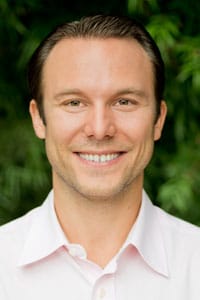If you had to choose one of the following: becoming a therapist, working as an investment banker on Wall Street or joining the CIA, which would you choose? At one time, Dr. Alexander Bacher had all three of these options before him and decided to enter the field of addiction and mental health treatment. His interest in psychology reaches back to his college days at Georgetown University, but when it came time to choose a career, Dr. Bacher pursued a path that promised financial stability and challenge: a Wall Street investment banker. Like so many others, Dr. Bacher was lured into the “work hard, play hard” lifestyle. But he quickly noticed a difference that intrigued him. “Somehow I knew when to call it quits and head home so I could work the next day,” he says, “whereas some of my friends developed addictions and lost their careers to drugs and alcohol. Friends of friends lost their lives.”
A Fork in the Road
Dr. Bacher wanted to understand why. Then 9/11 came. From his Wall Street office, he saw the horror of that day unfold before his eyes. Afterward, massive layoffs were taking place on Wall Street and Dr. Bacher took an attractive severance package as an opportunity to do some soul-searching. He applied to the CIA and, halfway through that process, applied to Pepperdine University to pursue his interest in psychology. His offer letter from Pepperdine arrived the week before an offer from the CIA. He chose to earn a doctoral degree in Psychology and become a licensed clinical psychologist. Given his longstanding interest in addiction, Dr. Bacher decided early on to focus on substance abuse treatment. He specialized in the assessment and treatment of drug and alcohol addiction while completing post-doctoral work at The Betty Ford Center and completed a clinical internship as well as externships at local hospitals and treatment centers. In 2011, Dr. Bacher joined Promises as a primary therapist. The program’s holistic approach, which integrates 12 Step principles as well as the full range of alternative therapies, was important to him. He also appreciated the balance of individual and group therapy at Promises, since research shows that a combination approach is most effective.
A Safe and Comfortable Therapeutic Alliance
An avid world traveler, Dr. Bacher has visited more than 50 countries and territories to date. A natural favorite is India, where he got engaged to his wife at the Taj Mahal. His travels not only enrich him personally but they also make him a better therapist. “Having been born and raised in New York City – a cultural melting pot – and exposed to so many cultures and belief systems in my travels, I’ve seen and heard everything,” says Dr. Bacher. “I am probably the most open-minded person you’ll meet, so whatever clients need to process, there’s no judgment from me.” Dr. Bacher has unconditional positive regard for all of his clients, but he doesn’t hesitate to challenge them when there is a need to take a hard look at some aspect of their lives. He uses cognitive-behavioral therapy and insight-oriented therapy, among other approaches, to help clients see how their past may have contributed to core beliefs and dysfunctional thought and behavior patterns that fuel addictive patterns. “For me, effective treatment is all about the therapeutic alliance,” says Dr. Bacher. “A client who feels safe and comfortable can truly open up and explore the issues contributing to their addiction.”
Modeling for Others What Was Modeled for Him
Warm, accepting, loyal and determined – these are personal characteristics Dr. Bacher credits to his mother and father’s strong role modeling. Growing up, a quote about persistence and determination hung over his bed like a foretelling of his life. With valedictorian of his high school class as his starting point, he has since accomplished everything he set his mind to, believing if you work hard enough and want it badly enough, you can do anything. Although he works extremely hard, gone are the 80-hour work weeks from his Wall Street days. Just as he teaches his clients, Dr. Bacher practices self-care and maintains a healthy work-life balance. In addition to traveling, he enjoys the performing arts, skiing, meditation and rollerblading by the beach – all of which, he says, nurture his mind, body and spirit. He now knows that the reason he didn’t fall prey to drug addiction when so many others like him did is that he didn’t have the combination of genetic, environmental and social factors that cause this disease. But few people escape completely. “You can be addicted to almost anything in life – drugs, alcohol, food, sex, gambling, emotional states and ways of being – and even if the problem isn’t the same, the underlying issues often are,” Dr. Bacher says. “As a therapist, the key is being a great listener and having empathy for whatever it is our clients are facing.”

